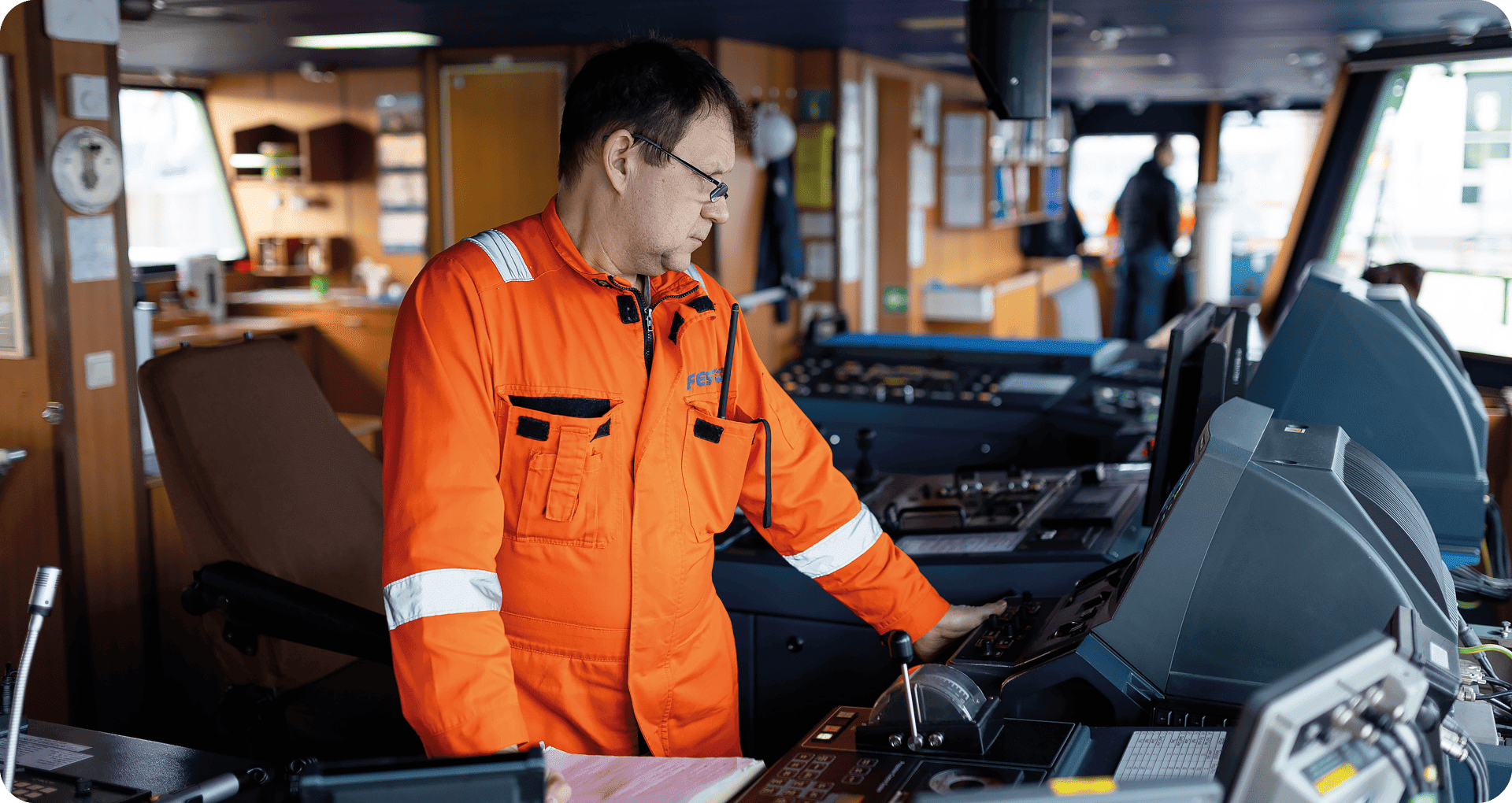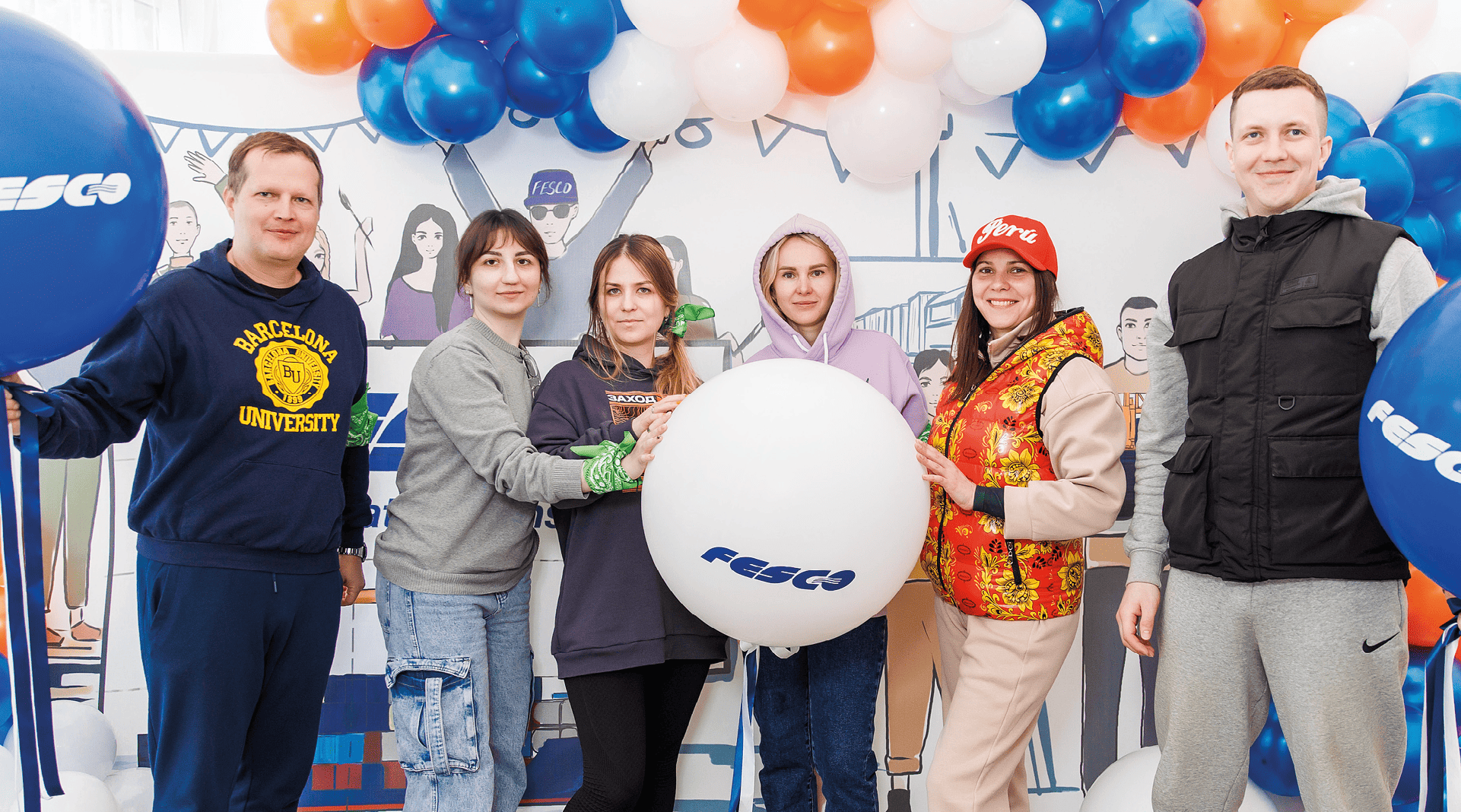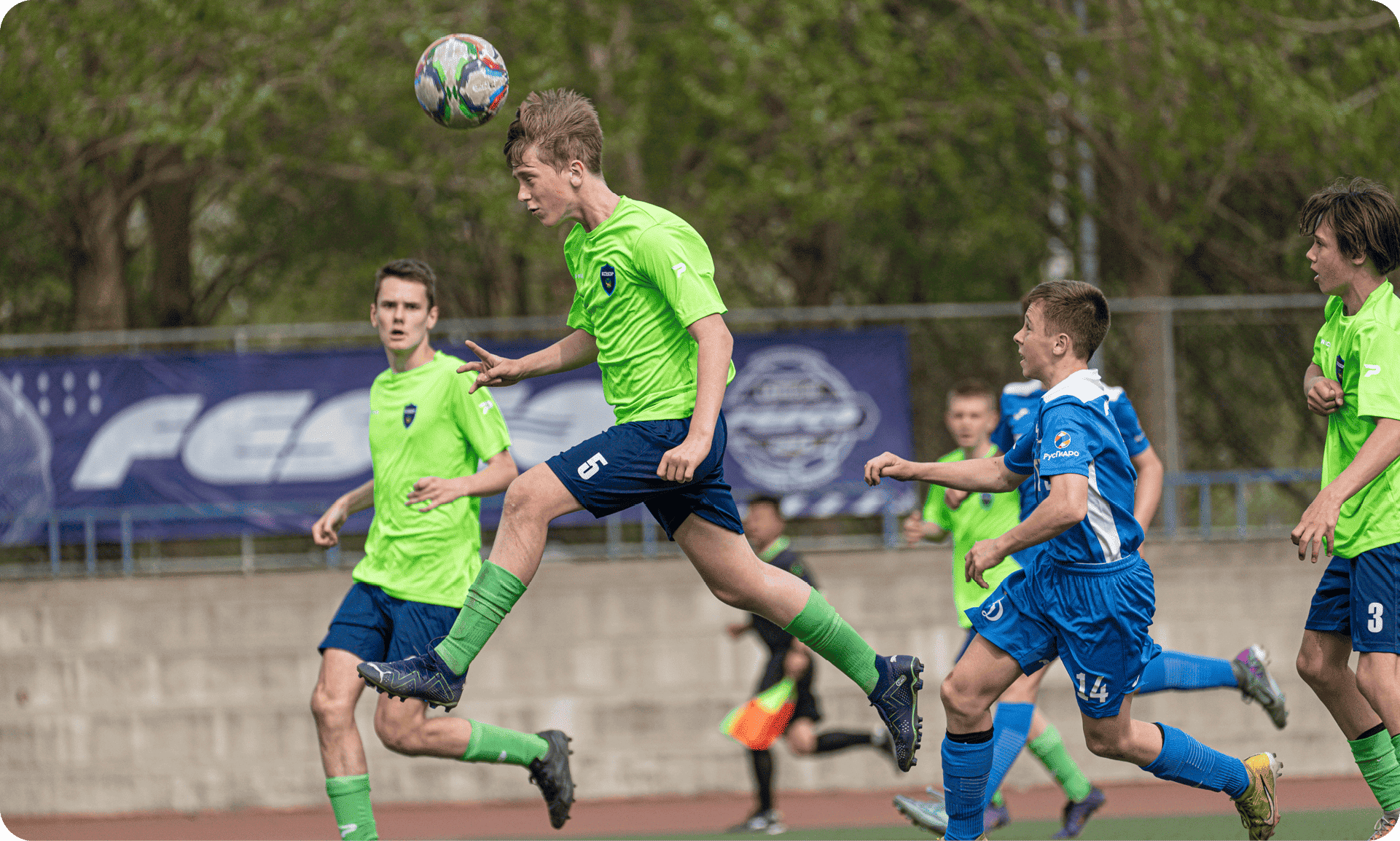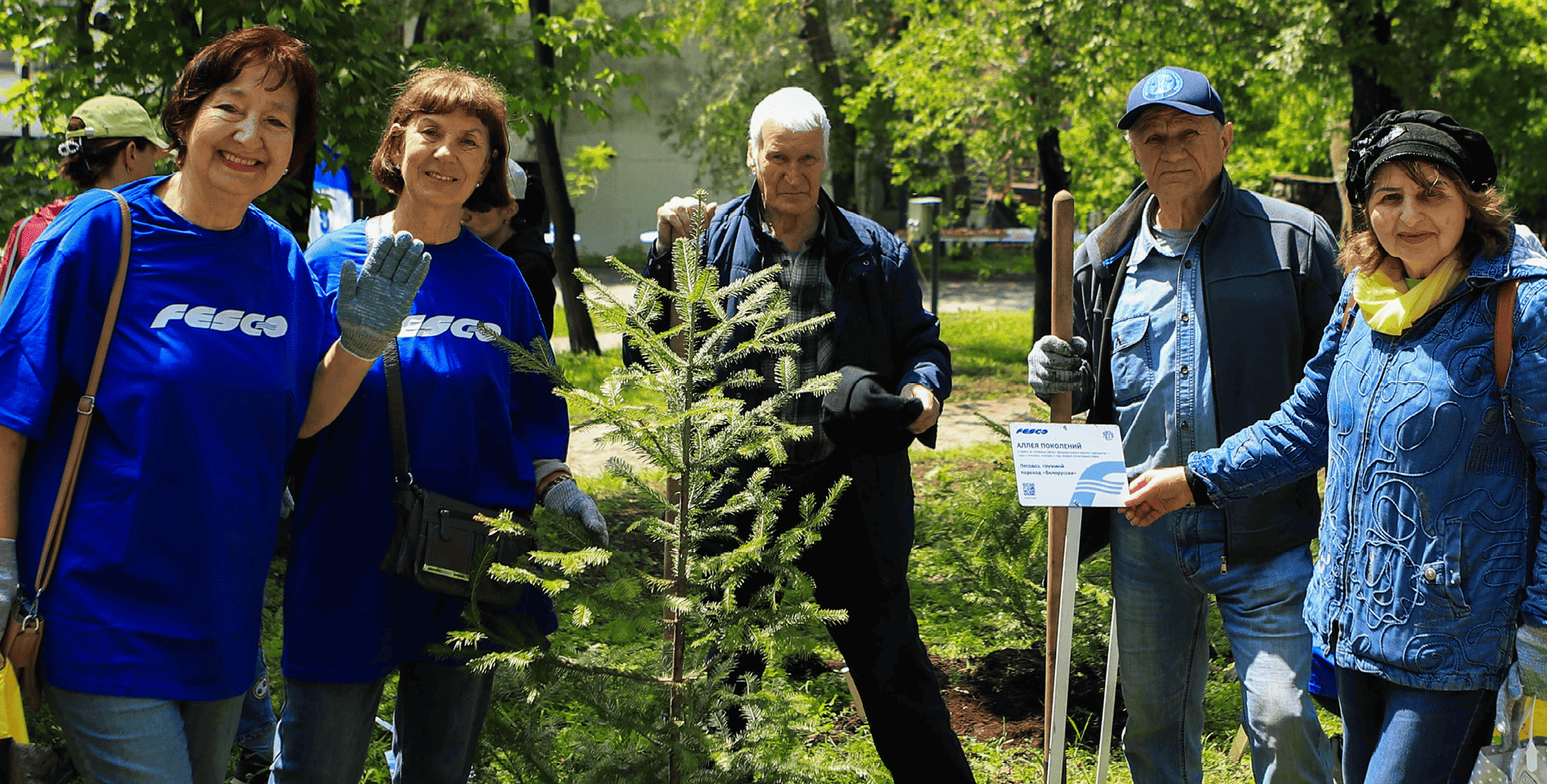Personnel
People are FESCO’s most valuable asset. We prioritise comprehensive staff support and regional development across our footprint as fundamental corporate commitments.
Self‑realisation opportunities and talent development form cornerstones of our personnel policy. We emphasise creating comfortable working environments and establishing trust with employees through adaptation and training programmes, professional skill development, and expanded benefits packages, including voluntary health insurance (VHI).
FESCO successfully implements its HR management strategy until 2025, which encompasses all aspects of employer and employee relations.
Staff acquisition:
- youth engagement development (Youth Council);
- wider geographical outreach and deeper student engagement;
- enhanced presence on social networks and specialised career platforms;
- automation of the staff recruitment process and development of the employer brand.
Staff development:
- corporate university and shared training system advancement;
- key position talent pool formation;
- career growth pathways;
- participation in cross‑functional projects.
Corporate culture and social protection:
- improvements in employee engagement;
- enhancement of the employer’s social responsibility;
- uniform corporate culture development;
- interaction with trade unions.
Improvements in the efficiency of HR management processes:
- HR process automation;
- HR process unification exceeding 90%, automation rate surpassing 70%;
- development of internal regulations based on unified standards (in line with both mandatory labour law requirements and additionally approved criteria to meet specific business needs);
- introduction of electronic workflow in HR processes.
Remuneration and incentives, employee benefits and organisational development:
- unified remuneration and incentivisation system;
- unified system of employee benefits;
- unified system for salary indexation and payroll reviews;
- staff performance management system;
- unified system for building organisational structures.
Thanks to the implementation of strategic personnel management initiatives, FESCO Transportation Group made it to the ratings of Russia’s best employers in 2024.
Staff composition
In 2024, FESCO’s average headcount increased by 3.8% to 6,798 FTEs. The increase was driven by business growth and the development of new business lines.
| Location | 2021 | 2022 | 2023 | 2024 |
|---|---|---|---|---|
| Russia | 5,008 | 5,702 | 6,313 | 6,540 |
| Asia | 146 | 146 | 202 | 202 |
| Europe | 33 | 35 | 34 | 56 |
| Total | 5,187 | 5,883 | 6,549 | 6,798 |
FESCO strictly observes Russian labour laws, respects employee rights and freedoms, offers equal opportunities, and guarantees employee protection against any form of discrimination.
Personnel turnover
Our effective HR policy and use of a variety of staff recruitment methods helped reduce the voluntary personnel turnover rate by 2.7% to 13.7% in 2024 – our lowest figure in four years.
Incentives
Financial incentives
We aim to create comfortable working conditions through competitive salaries and comprehensive corporate benefits.
Our remuneration system, aligned with the corporate strategy, focuses on improving operational efficiency and productivity, achieving strong results, and retaining highly qualified personnel. The incentive scheme provides for remuneration payment depending on the Company’s operating and financial performance and employees’ personal contribution.
FESCO establishes salaries without regard to gender, age, race, nationality, origin, or religion.
Our work regulations, developed with trade union input, establish working hour parameters in accordance with Russian Labour Code standards – 40 hours weekly for standard positions and no more than 36 hours weekly for employees working in harmful and/or dangerous conditions.
All weekend and overtime work is paid for in accordance with the Labour Code of Russia.
In 2024, FESCO adopted a unified approach to employee incentives and benefits (VHI, business trip and hospitality expenses, mobile telephony and transportation, relocation and training).
Social protection
FESCO provides its employees with social protection and benefits over and above those provided for by the Russian labour laws, which helps increase labour efficiency and performance. All FESCO employees hold VHI policies and can receive free medical care at the country’s best healthcare facilities specified in the insurance contract. The VHI programme covers outpatient care, hospital services, preventive vaccination, dental care, treatment procedures, round‑the‑clock trauma services, diagnostic testing, healthcare at home, and emergency medical services.
VHI policies are made available to all of the Company’s employees in the first month of their employment. In 2024, VHI expenses increased by 23% compared to 2023, reaching over RUB 160 million.
FESCO offers its employees financial aid on special occasions in their life or to help them and their families overcome serious health issues. In 2024, we formalised nine financial assistance categories:
- child birth/adoption: RUB 50,000 per child;
- third and subsequent child birth/adoption: RUB 100,000 per child;
- close relative death: RUB 50,000;
- employee death payment to close relatives: RUB 50,000;
- education, medical expenses, and psychological assistance: up to RUB 300,000 annually;
- employee marriage: RUB 10,000;
- personal property damage/loss from emergencies: up to RUB 100,000;
- surgeries or prolonged illness affecting employee or dependants: 30% of expenses, but no more than RUB 100,000;
- employee disability: up to 60 statutory minimum wages depending on disability category.
In 2024, social expenses amounted to around RUB 486 million, reflecting an 8.3% decrease from 2023 due to corporate event spending optimisation.

Staff recruitment and acquisition
FESCO strengthened its position amid intensifying labour market competition in 2024. We focused on strategic HR brand development, internal process refinement, new technology implementation, and active young specialist engagement.
We launched an artificial intelligence candidate screening pilot project for more effective recruitment.
Our employer image enhancement, particularly among younger demographics, was supported through intensive educational institution collaborations, professional conference participation, and university partnerships. These initiatives generated a substantial increase in vacancy responses (by 10%) while maintaining high candidate loyalty. Efficient process automation and external cost reduction decreased our per‑vacancy fulfilment cost by 5%.
| Indicator | 2021 | 2022 | 2023 | 2024 |
|---|---|---|---|---|
| Job requisitions received | 1,193 | 1,655 | 1,839 | 1,941 |
| Indicator | 2021 | 2022 | 2023 | 2024 |
|---|---|---|---|---|
| Commercial personnel | 49 | 145 | 206 | 210 |
| Blue‑collar employees | 65 | 413 | 412 | 417 |
| Middle management | 42 | 622 | 770 | 795 |
| Top management | 58 | 28 | 29 | 25 |
| Total requisition fulfilment speed, days | 49 | 39 | 37 | 37 |
Recruitment of young professionals
To attract young professionals, we have a standalone function – Young Talent Engagement and Cooperation with Educational Institutions, which pursues three primary objectives:
- staff FESCO with qualified personnel, including rejuvenation of the workforce;
- attract young professionals from universities and vocational schools in the regions of operation, including through internships, apprenticeships, and employment;
- provide career guidance for schoolchildren in the regions where FESCO operates.
FESCO’s youth policy has four focus areas:
1. Cooperation with universities and vocational schools. Engagement with existing students and young talents to get them work in FESCO Transportation Group.
Partnerships were established with the following Russian universities:
- Far Eastern Federal University (Vladivostok);
- Admiral Nevelskoy Maritime State University (Vladivostok);
- Vladivostok State University (Vladivostok);
- Far Eastern State Technical Fisheries University (Vladivostok);
- Siberian State University of Water Transport (Novosibirsk);
- Siberian Transport University (Novosibirsk);
- Novosibirsk State University of Economics and Management (Novosibirsk);
- Admiral Makarov State University of Maritime and Inland Shipping (St Petersburg);
- Saint Petersburg State University of Economics (St Petersburg);
- Russian University of Transport (MIIT) (Moscow);
- Moscow Automobile and Road Construction State Technical University (MADI) (Moscow);
- Financial University under the Government of the Russian Federation (Moscow);
- Kutafin Moscow State Law University (Moscow);
- Higher School of Economics (Moscow);
- Admiral Ushakov Maritime State University (Novorossiysk);
- Kazan Federal University (Kazan).
We actively engage with educational institutions in Vladivostok, Moscow, St Petersburg, and Novosibirsk to facilitate student practical training, internships, and graduate employment across Group divisions.
Collaboration with universities is structured around four areas:
- science and education:
- teaching;
- workshops;
- conferences;
- open lectures;
- selection and assessment of students for future employment in FESCO Transportation Group:
- case tournaments;
- project activities;
- participation in the state examination boards;
- development of professional skills in students:
- apprenticeships;
- internships;
- employment;
- involvement in projects;
- work in a project management office (Far Eastern Federal University);
- social and sponsorship support:
- classroom renovations;
- establishment of public creative spaces (co‑working spaces);
- assistance in maintaining administrative and household property.
FESCO’s 2024 student project collaborations included:
- Russia’s first inter‑university industry championship for maritime specialty students (involving five Russian universities);
- economics and logistics championships conducted annually (involving four Vladivostok universities);
- development of over 15 projects jointly with universities;
- establishment of the Sea Inside co‑working space at the Far Eastern Federal University;
- establishment of the Sea Inside co‑working space at the Admiral Nevelskoy Maritime State University, which serves as a multifunctional student centre.
2. Career guidance and industry promotion. Engagement with school students and graduates to help them choose their future profession and to raise awareness about opportunities offered by the Primorye Territory and the Russian Far East.
3. Industry ambassadors. Transfer of practical professional knowledge to students and professors, development of communication between educational institutions, industry representatives, and FESCO.
4. Social and sponsorship support for key educational partners.
| Academic year | 2021/2022 | 2022/2023 | 2023/2024 |
|---|---|---|---|
| Total admissions | 2,285 | 2,320 | 2,228 |
| Traineeships | 135 | 193 | 236 |
| Internships | 38 | 71 | 85 |
| Graduates employed | 102 | 115 | 98 |
| Share in the total number of people employed | 6.1% | 8.0% | 8.2% |
Personnel training and development
FESCO’s main goals in rolling out educational projects are to achieve global objectives of personnel training for the transport and logistics industry. A strong talent pool is impossible without early career guidance programmes for schoolchildren, which is why FESCO places special emphasis on such projects.
Professional development reached new heights with the 2023 launch of the FESCO Academy. This educational initiative employs experienced trainers, methodologists, e‑learning specialists, and assessment professionals. The FESCO Academy represents an ecosystem incorporating current educational trends across several domains: adaptation, training and development, assessment and talent management, mentoring, and succession planning.
In 2024, the FESCO Academy successfully:
- expanded educational solutions for port specialists, ship crews, and cargo movement personnel;
- secured occupational safety and fire safety training accreditation;
- automated and digitalised production personnel and ship crew training processes;
- launched foreign asset employee training and development initiatives.
In 2024, we developed more than 50 educational solutions addressing Group needs. We leverage artificial intelligence for educational content development, integrating generative AI into image selection and processing, summarisation of texts (including technical ones), and development of verification cases and assignments. This significantly reduces course and simulator production time and costs.
The internal expertise built as part of the personnel training and development process does not prevent the Company from engaging external providers. FESCO employees attend conferences, seminars, training sessions, and practical workshops, while the corporate Academy helps select the best available solution and process structure.
The applied nature of selected subjects and an opportunity to put the acquired knowledge into practice are important aspects of the training process. To further enhance the learning process, the Academy has an assessment unit designed to build core corporate competencies, develop profiles for different job categories, and find solutions for automating both the assessment process and issuance of recommendations in the form of individual development plans.
The Academy facilitates experience exchange platforms. We hosted two St Petersburg conferences, each engaging about 100 navigators, senior mechanics, and senior electrical engineers. Programmes addressed maritime safety, cybersecurity, ship survivability, ship supply and repair, and shore service interactions. Participants from other shipping companies joined these discussions and praised their practical focus and relevance of discussed topics.
Our New Generation Intelligence conference on AI in logistics provided another open dialogue forum. Industry experts and FESCO representatives explored unmanned technologies, digital port solutions, generative neural networks for operational tasks, and related topics.
- 30 internal training programmes;
- 1,115 employees;
- 92% NPS (Net Promoter Score).
- 4,056 courses completed;
- 1,561 students completed courses in 2024;
- 6,123 employees registered on the platform.
- 344 training requests;
- 1,450 student participants;
- 494 students completed Skyeng online foreign language training.
- 1,190 simulator sessions;
- 559 specialists trained.

Corporate culture
FESCO’s corporate culture embodies our Group’s values, principles, and objectives, drawing upon our rich 145‑year history. Key corporate culture initiatives include:
- business ethics;
- internal communications and employee engagement research;
- corporate events.
We regularly conduct targeted surveys and engagement level assessments to evaluate our social programme effectiveness. More than 79% of Company employees participated in our 2024 engagement study.
Cultural and corporate events
In 2024, cultural and corporate event expenses increased by 34% compared to 2023, reaching over RUB 188 million.
Our FESCO Time family values corporate event attracted 6.3 thousand employees in 2024. Vladivostok hosted more than 40 events bringing together over 4 thousand people.
We provided 6.5 thousand employees with state holiday gifts. Additionally, all children of employees under the age of 14 received New Year gifts from the Company. First‑grade children received complete school supply backpacks.

Sports
Employee sports engagement and healthy lifestyle promotion represent vital FESCO corporate culture components. Sports positively influence work efficiency through team interaction development.
Group companies provide all the basic opportunities for employees wishing to practise sports:
- Moscow: regular football, hockey, yoga, and volleyball training;
- Vladivostok: regular swimming, football, volleyball, stretching, basketball, and hockey sessions;
- St Petersburg: regular football training.
We constructed a modern employee gym at VMTP offering both group and individual training sessions.
Port workers can visit a swimming pool and attend volleyball, basketball, futsal, hockey, jogging and wrestling classes for free. Furthermore, VMTP hosts friendly Russian bench press, table tennis, and ice hockey competitions.
Our sports development initiatives have established dedicated teams within the Company: VMTP Tigers (basketball), Portovik (football), and VMTP Sharks (hockey).
Employees participate (including as part of teams) in various sports competitions of the Primorye Territory – winter and summer business spartakiads, the Interregional Amateur Basketball League, Alternative Hockey League of the Primorye Territory, Hockey Federation Cup of the Primorye Territory, Open Futsal Championship of Vladivostok, Open Football Championship, etc. – and win different awards. FESCO’s employees also take part in sports marathons such as Vladivostok Bridges and Hero Race.
We hosted 14 sports events in Vladivostok during 2024, engaging over 800 participants. In total, more than 20 sports events across FESCO’s operational cities attracted over 1.2 thousand participants.
We organised our first FESCO football tournament for all Group employees in 2024, with final rounds in Moscow. Tournament champions participated in Rosatom’s memorial football match honouring Efim Slavsky.
More than 313 employees took part in the Hero League events – Hero Race and ZaBeg.

Trade unions
FESCO’s trade unions are represented by six shop‑floor trade unions consolidated into regional trade union organisations of Vladivostok and the Primorye Territory and forming part of three public organisations: the Primorye Territory Public Organisation of Sea Port Workers of the Russian Dockers’ Union, the Water Transport Workers Union, and the Russian Seafarers’ Union which is affiliated with the International Transport Workers’ Federation.
In their activities, the trade unions of dockers and seafarers represent and protect the rights and legitimate interests of the trade union members in matters associated with labour relations and coordination of the trade union organisations’ efforts to protect trade union members’ individual and collective social, labour, professional, and other related rights and interests.
Over 30% of FESCO employees are trade union members, of whom approximately 25% are managerial staff and 75% are operational personnel.
In 2024, the trade unions provided social support to trade union members and their families in the following areas:
- financial support (in connection with illness, death, child birth, marriage registration, employees’ anniversaries, retirement, as well as for families with multiple children and those raising disabled children), benefitting 535 members;
- recognition of 31 members for 25 years of professional service;
- 95 corporate events for trade union members;
- tennis and chess tournament organisation;
- Victory Day recognition for veteran home front workers;
- gifts for children at Vladivostok’s special needs school at 36 Safonova St.;
- cultural and theatrical event access.
The trade unions maintain an ongoing and constructive dialogue with the employer – FESCO Transportation Group.
All collective bargaining agreements were extended in their entirety through 31 December 2025.

FESCO Council of War and Labour Veterans
FESCO provides financial support to both the FESCO Council of War and Labour Veterans and the VMTP Council of Veterans. Funding supports:
- financial assistance provided in connection with illness and costly medical treatment, including for the purchase of medications, dental treatment, and prosthetics;
- partial compensation of funeral costs to the families of deceased veterans;
- operations of the Council of War and Labour Veterans;
- quarterly pensioner payments;
- jubilee payments;
- one‑time financial assistance paid on the Victory Day, on the Day of Sea and River Fleet Workers, and to the widows of deceased sailors.
Youth Council
We established the FESCO Youth Council in 2024, hosting two council member events, developing a strategy, and implementing its first initiatives. More than 200 employees under the age of 35 participated in Youth Council activities during 2024.
Code of Corporate and Business Ethics
FESCO strictly observes labour laws and regulations, upholds employee rights and freedoms, offers equal opportunities, and guarantees employee protection against any form of discrimination. FESCO’s ethical conduct rules apply to employee relations through its Code of Corporate and Business Ethics, which states that the Company has no work limitations based on gender, ethnic origin, religion, or any other grounds or circumstances unrelated to employees’ business qualities.
FESCO adheres strictly to these employee‑focused principles:
- Non‑discrimination. The Company respects cultural diversity and individual differences among employees, and prohibits all forms of discrimination, including by gender, nationality, language, social background, age, religious beliefs, and others. The Company strives to participate in the social and political life of local communities in the regions of operation, and treats people in a fair and just manner.
- Prohibition of child and forced labour. The Company’s employees work on a voluntary basis, they are familiar with the working conditions and receive regular wages. The Company upholds children’s rights, taking a zero tolerance approach towards child labour.
- The Company guarantees people dignity and equality by preventing all forms of persecution and violence and taking appropriate response measures.
- Official employment and personnel decisions guided by legal and objective criteria such as employees’ knowledge and skills.
- Decent, competitive, and fair remuneration that meets or exceeds the statutory minimum wage requirements; equal pay for equal work, taking into account salary differences across regions.
- Compliance with all regulatory requirements on working and rest hours, commitment to minimising overtime work (in situations where it is not required by production needs) and to ensuring appropriate compensation.
- The Company provides equal access to social guarantees, benefits, and training opportunities to all stakeholders to help them maintain sufficient living standards necessary for health, well‑being, and improvements in life quality.
- Effective communication between employees and management, respect for freedom of association and collective bargaining, timely notification of employees about changes that might affect them.
The Company takes a responsible approach to respecting the rights and addressing the issues related to the well‑being of local communities and indigenous peoples in the areas of operation. It also collaborates with relevant government authorities and respects residents of the areas where it operates.
The Company follows the principles of an honest, fair, and open policy in respect of both its own staff and external counterparties. As part of this commitment, we focus on:
- promoting open attitudes in business communication;
- ensuring workplace management conducive to effective teamwork and employees’ satisfaction with their job;
- creating and maintaining a stable, positive psychological climate within the team that encourages open exchange of opinions, effective problem‑solving, and the unlocking of employee potential;
- creating conditions for staff training and skill enhancement.
The Code of Corporate and Business Ethics applies to staff relations with external counterparties.